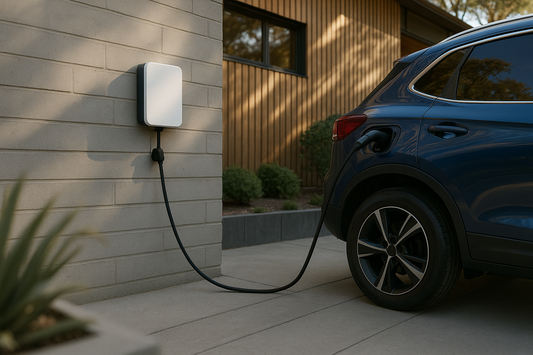The wheels of change are turning in the automotive industry in Australia, with the impending arrival of the Australian Government's New Vehicle Efficiency Standard. This robust new standard is set to revolutionize the country's fleet of automobiles, focusing on ushering in a variety of cleaner, more economical vehicles to reduce the carbon footprint and address climate change.
With this content, we're laser-focused on the possible ripple effects this standard will have on Electric Vehicles (EVs). Grab a charging cable and join us as we dissect the legislation, forecast the changes in the EV landscape, and map out what it means for enthusiasts, current EV owners, and those on the fence about making the switch.
Current State of EVs in Australia
Australia has been described as 'the land of petrolheads,' with a car culture so deeply ingrained in its society. However, the tide is turning, albeit gradually, as EVs are beginning to make tracks in the market. Here's a snapshot of where EVs currently stand:
- As of the last quarter, the EV adoption rate has surged by 200% year-over-year, signifying a doubling in the rate at which Australians are embracing electric mobility.
- The annual growth rate of EV sales now sits at an impressive 53%, suggesting a robust trajectory towards a greener automotive sector.
- Presently, Australia boasts over 2,500 public charging stations, encompassing both Level 2 and DC fast charging options, marking a 40% increase from the previous year.
These metrics not only indicate a positive shift in consumer sentiment but also reflect the nation's evolving socio-economic landscape which increasingly favors sustainable practices.
Changes Expected for EVs
The New Vehicle Efficiency Standard is poised to be a game-changer, especially for the EV segment. Here are some areas where it's projected to make a mark:
Benefits of the New Standard for EV Owners
- Enhanced Performance: The standard will likely push manufacturers towards creating more efficient propulsion systems, which could mean better range and performance for EVs.
- Affordability: As the demand for cleaner technology grows, economies of scale may drive down the manufacturing costs of EVs, potentially making them more affordable for the average consumer.
- Accessibility: The legal framework of this standard could open the doors to a wider variety of EV options in the Australian market, catering to different consumer needs and preferences.
Challenges or Adjustments Needed in the EV Industry
- Infrastructure Readiness: With an expected increase in EV numbers, the current infrastructure might face some growing pains, requiring a strategic approach to sustain the rise effectively.
- Manufacturer Compliance: There could be short-term turbulence as manufacturers adjust to the new regulations. However, the long-term outcome promises a more robust, sustainable industry.
- Educational Efforts: There's a need for extensive consumer education to address myths about EVs and to ensure potential buyers are well-informed about the benefits and practicalities.
Implications for Consumers
For those considering the shift to EVs, the impending standard brings a basket of potential upsides, as well as some myths that need debunking:
Cost Savings and Environmental Benefits
- Reduced Fuel Costs: The efficiency standard will push for vehicles that are cheaper to run, potentially leading to significant savings for EV owners in the long term.
- Green Credentials: EVs are a cornerstone of eco-friendly transportation. With the standard in place, Australian EVs could become symbols of sustainability, aiding in the fight against climate change.
- Longevity and Resale Value: Arguments often surface concerning the longevity and resale value of EVs. However, as technology advances, these concerns are increasingly becoming obsolete.
Potential Challenges or Misconceptions to Address
- Initial Investment: While the upfront cost of EVs might be higher, the total cost of ownership, including savings on fuel and maintenance, typically makes EVs the more economical choice over time.
- Range Anxiety: This classic EV myth is eroding with every new model, boasting longer ranges and quicker charging solutions that are making range concerns a thing of the past for most drivers.
- Environmental Impact: Despite the initial manufacturing footprint, the operational years of EVs are inherently cleaner due to their zero tailpipe emissions, making them a net positive for the environment.
Government Support and Incentives
To complement the New Vehicle Efficiency Standard, the Australian government is also expected to roll out a suite of support policies and incentives. These could include:
- Financial Incentives: Ongoing rebates and incentives for the purchase of EVs, perhaps with a focus on models that meet the highest efficiency standards.
- Tax Credits: Potential tax benefits for both consumers and manufacturers to encourage the growth of the EV market and local clean technology industries.
- Funding for Innovation: Investments in research, development, and innovation to support the continued advancement of EV technology.
Conclusion
The arrival of the New Vehicle Efficiency Standard in Australia is more than just a change in policy; it's a roadmap to a cleaner, more sustainable automotive landscape. For the EV segment, it's filled with promises of accelerated growth, increased consumer adoption, and an overall positive impact on the environment.
While challenges and misconceptions still need to be addressed, the Australian public and the EV industry stand at the precipice of a new era. The key to unlocking the immense potential of EVs in this context will be a concerted effort from all stakeholders – from government bodies to manufacturers and the media – to make information accessible and the transition as seamless as possible.
Ready to accelerate toward a greener future? The EV industry is, and it's charged up for the ride. Who knows? Australia might just pave the way for the next wave of global EV enthusiasts.
Whether you're an automotive enthusiast, a current EV owner, or simply curious about what this means for the landscape of Australia's roads, the content laid out here should drive home the monumental possibilities that lie ahead. Remember, knowledge is power – and in the case of EVs, it's also the pulse of change.



